#apartheid south africa
Explore tagged Tumblr posts
Text
The Secret and Explicit Goals and Deeds of the Zionists : Free Download, Borrow, and Streaming : Internet Archive
Get it while you can.
Reblog Reblog RE Reblog
#zionist nazi#zionism is racism#zionazi#anti zionisim#zionistterror#zionistcensorship#zionist#free palestine#palestine#free gaza#gaza#genocide#israel is a terrorist state#i stand with palestine#end the genocide#israel#israhell#nazi israel#nazi germany#Holocaust#south africa#apartheid South Africa#Apartheid Israel#israeli apartheid#zionism#reblog#reblog is the new like#zionazis
65 notes
·
View notes
Text
#free palestine#palestine#israel#gaza#free gaza#israeli occupation#genocide#boycott israel#keep boycotting#boycott mcdonalds#israeli apartheid#apartheid south Africa#boycott apple#congo#free congo#dr congo
7 notes
·
View notes
Text
30 years ago today.
I’m posting this because I study history.
And in case any stupid British armchair historians start bleating on about the usual crap.
The details are as follows.
Members of the UVF armed with machine guns (supplied by apartheid South Africa (who in turn bought them from Israel after they raided a PLO arms depot, idk the exact details beyond that) and the British government) burst into a pub in the village of Loughinisland and murdered 6 people. All of whom were innocent unarmed civilians.
It was also during the 1994 World Cup but that’s not strictly relevant.
It was believed that the attack was organised in cooperation with the RUC as well, with investigations pointing to evidence of collusion.
Why did they do this? Because they felt they ought to.
So they killed innocent people simply because that’s all they were capable of.
Because they viewed Irish people as being subhuman, soulless monsters deserving of death.
Which btw far too many idiots today still believe for some baffling reason, like what is this? 1875?
And which by the way we AREN’T!
Away with that shite!
Such attacks were hardly unusual for the UVF, most people they killed were innocent unarmed civilians.

Above: A memorial site dedicated to the victims of the attack.
Here’s an article from a few years ago too.
Also a link to one of the relevant investigations along with a relevant article.
Before any loyalists, or British or American far right fascist types or stupid Tories show up to bitch at me for posting about this, keep in mind that I study history!
I have an obligation to post about this stuff. As I’ve done for prior events on relevant dates.
So kindly shush up!
Feel free to reblog as well.
#dougie rambles#political crap#history#northern ireland#ireland#terrorism#fuck loyalism#the troubles#massacre#loughinisland massacre#atrocities#irish history#remembrance#commemoration#apartheid south africa#israel#tangentially#dirty war#loughinisland#war crimes#RUC#feel free to reblog#1994#1994 World Cup#colonial terrorism#colonial violence#collaboration#collusion#MI5
5 notes
·
View notes
Text
I'd also recommend looking into Nelson Mandela's National Reconciliation government, which dismantled apartheid in South Africa.
The thing is, until you get past the mindset of "justice=punishment" you will never be able to create lasting change. We have actual proof that punitive justice creates more crime and makes criminals more violent. We have actual proof that rehabilitation reduces crime and recidivism. But some of y'all are so stuck on this idea that the wrongdoer must be punished for justice to be done that you will choose sating your need for revenge over actually moving toward a better world every time. And that's sad!
63K notes
·
View notes
Text
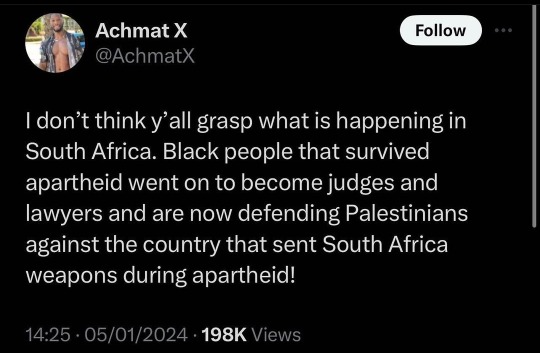
"We know too well that our freedom is incomplete without the freedom of the Palestinians."
~ Nelson Rolihlahla Mandela.
#my people#southafrica4palestine#palestine#free palestine#free gaza#free west bank#gaza#gaza strip#israel#social justice#human rights#apartheid#genocide#middle east#south africa#the starbucks boycott is for life#jerusalem#tel aviv#🇿🇦🫶🏻🇵🇸
49K notes
·
View notes
Text
.
In 1964, while visiting Victoria Falls on the Zambian side, Meir, as foreign minister, was invited across the border to Rhodesia (today Zimbabwe) by its white supremacist rulers. Meir refused. By all accounts, she sincerely believed that racism against black Africans was wrong. Still, there were always those who saw in Meir and her country something less than egalitarian. “They took Israel away from the Arabs after the Arabs lived there for a thousand years,” said South African prime minister Hendrik Verwoerd in 1961. “In that, I agree with them. Israel, like South Africa, is an apartheid state.”
The charge of Israeli apartheid has long been rejected by Zionists as antithetical to the very nature of a Jewish state infused with the traumas of its people. The special nature of Israel’s mission as antiracist flows through the words of its own leaders, from David Ben-Gurion (“A Jew can’t be for discrimination”) to Shimon Peres (“A Jew who accepts apartheid ceases to be a Jew”) to Benjamin Netanyahu (“For the Jewish people, apartheid is the ultimate abomination. It is an expression of the cruelest inhumanity. Israel will do everything possible to eliminate this odious system.”). This rhetoric is undercut by history.
In 1974, with Meir now prime minister, Haaretz began mining the darkest depths of white racism—publishing a caricature of cannibalistic African leaders devouring Israeli politicians, while Meir danced with an African man. That same year, Meir—once horrified by white racism in Africa—dispatched then-Israeli defense minister Shimon Peres to to Pretoria. On his return to Tel Aviv, Peres thanked his host, stressing that “the new links which you have helped to forge between our two countries will develop into a close identity of aspirations and interests which will turn out to be of longstanding benefit to both our countries.”
That is exactly what happened. Israeli officials opened a lucrative arms trade with South Africa, upgraded its air force, and held an annual joint intelligence conference. South African officials hosted 134 their Israeli counterparts on safaris, enjoyed Israeli support for their dubious “Bantustan” policy, and kept an open dialogue on the best practices by which one might best divorce a people from its various freedoms. In 1977 South African Army chief Constand Viljoen marveled at the efficiency of the Israeli checkpoints in the Occupied Territory. “The thoroughness with which Israel conducts this examination is astonishing,” Viljoen noted in 1977. “At the quickest, it takes individual Arabs that come through there about one and a half hours. When the traffic is heavy, it takes from four to five hours.”
By the time Begin took office in the late 1970s, no single country was buying more Israeli arms than South Africa. The money for those guns was plundered from Black South Africans deprived of their rights and then used to fund a Zionist order that subsequently deprived Palestinians of theirs. When Israel was finally pressured into publicly severing ties with South Africa in the mid-1980s, its national security establishment was apoplectic. “A change in the security export policy will mean the firing of tens of thousands of workers,” warned Defense Minister Yitzhak Rabin. “I hereby inform you that they will not find an alternative opportunity.”
Quietly, Israel agreed. While publicly distancing itself from South Africa, the trade continued, right up until the fall of apartheid. Among the last conversations: the production and employment of chemical and biological weapons. All told, from 1974 to 1993, total annual exports from Tel Aviv to Pretoria averaged $600 million a year. Through all those critical years, Israel was not just an ally of South Africa; it was the very arsenal of apartheid.
And this partnership was not strictly a matter of realpolitik, but of a genuine affinity. During World War II, the Afrikaner politician John Vorster lobbied for his country to enter the war on the side of Nazi Germany, despite South Africa’s historical ties to the United Kingdom. “We stand for Christian Nationalism, which is an ally of National Socialism,” Vorster said. “In Italy it is called Fascism, in Germany National Socialism, and in South Africa Christian Nationalism.” But by 1976, Vorster was the prime minister of South Africa—a state with deep ties to Israel. That year he was received as a guest at that indelible site of Jewish pain and mourning, Yad Vashem.
There were dissidents in Israel who saw in this reception a betrayal of Zionism. Arthur Goldreich had fought in the 1948 war that brought Israel into existence. But as a South African Jew, he well knew the evil that Vorster represented. Goldreich began hanging posters on telephone poles equating Vorster with Nazism, in protest of the prime minister’s visit. His protest was interrupted by an elderly man who had an Auschwitz tattoo. Goldreich thought that the man would sympathize with him. Instead, he spat on the poster and said, “We will make agreements with the devil to save Jews from persecution and to secure the future of this state.”
But the security of Israel did not just require an agreement with apartheid—it required that Israel practice apartheid itself. Like the charge of colonialism, Israel’s defenders claim that the apartheid charge is little more than ad hominem seeking to undermine that last redoubt of the Jewish people. Human rights groups disagree and point to the definition enshrined by international law which defines the crime of apartheid as “inhuman acts committed for the purpose of establishing and maintaining domination by one racial group of persons over any other racial group of persons and systematically oppressing them.”
This definition matched everything I saw on the ground during my trip. Perhaps more importantly, Israel’s own leaders have long seen apartheid as well within the range of possibilities for its government. In 2007, Israeli prime minister Ehud Olmert warned that without a “two-state solution” Israel would face “face a South African-style struggle for equal voting rights.” The result of that struggle in Olmert’s mind would be grim—“the state of Israel [would be] finished.” Three years later, Ehud Barak then serving as Netanyahu’s Defense Minister issued a warning:
“As long as in this territory west of the Jordan river there is only one political entity called Israel it is going to be either non-Jewish, or non-democratic. If this bloc of millions of Palestinians cannot vote, that will be an apartheid state.”
I think back to my visit to Yad Vashem and I think back to sitting there, contemplating the Book of Names. I think of myself standing before the conveyor belt of time. And I think of John Vorster in that same space. I see him laying a wreath bearing the colors of his country before a memorial to the victims of the Shoah. And I see the literal standard of white supremacy taking its place at a monument to some six million of its victims.
The link is colonialism, which has always had a racist cynicism at its core—a belief that the world is not just savage, but that the most dangerous savages tend to live beyond the borders of the West. Zionism—which from the outset sought to position itself as “an outpost of civilization against barbarism”—has never rejected these precepts. The Israeli historian Benny Morris has been celebrated for his willingness to see Zionism’s history with clarity and candor. Would that he could bring that same clarity to Zionism’s victims. In a 2004 interview with Haaretz, Morris described Palestinians as “barbarians who want to take our lives.” There was but one way to constrain the threat: “something like a cage has to be built for them.… There is a wild animal there that has to be locked up in one way or another.” Pushed to reflect on the fate of those to be “locked up,” Morris could barely muster a shrug. Instead, Morris approvingly invoked a genocide. “Even the great American democracy could not have been created without the annihilation of the Indians.”
- Ta-Nehisi Coates, The Message
#repost of someone else’s content#book excerpt#ta-nehisi coates#the message#racism#white supremacy#colonialism#settler-colonialism#israel#anti israel#palestine#free palestine#oppression#antiblackness#genocide#apartheid#south africa#apartheid south africa#history#golda meir#yitzhak rabin#benny morris#hendrik verwoerd#john vorster#nazism#antisemitism
1 note
·
View note
Photo
(... now where have we seen exactly the same techniques, the same kind of building-blocks used to construct "arguments" recently ...)
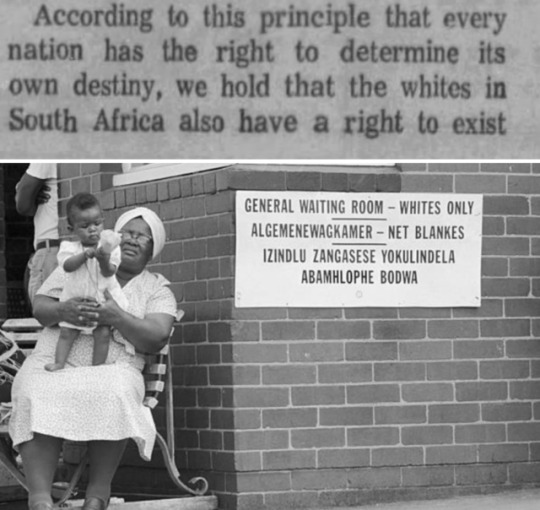
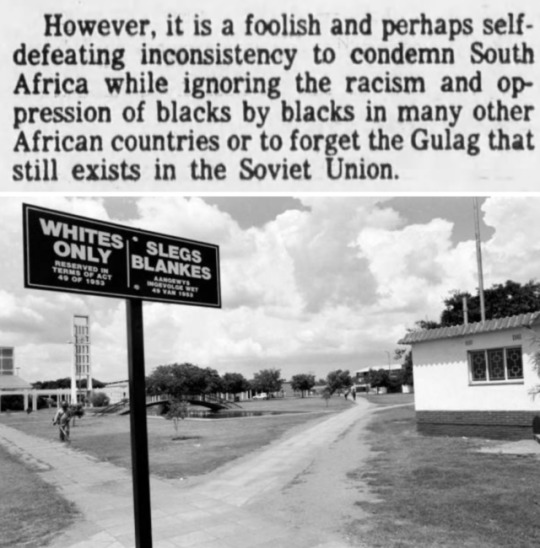
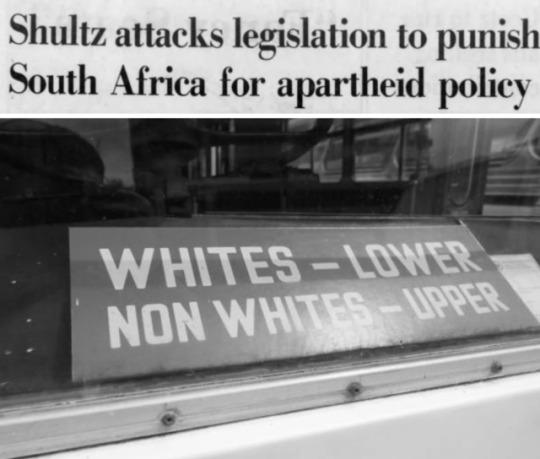
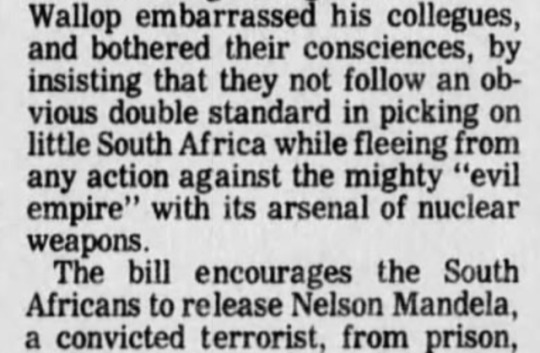
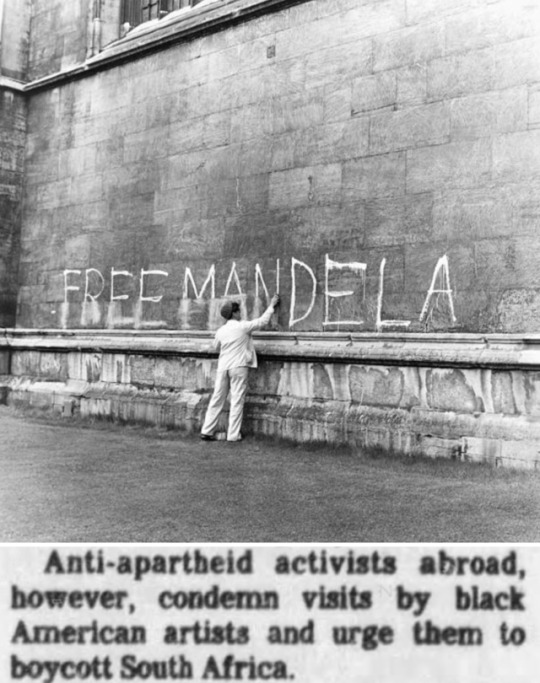
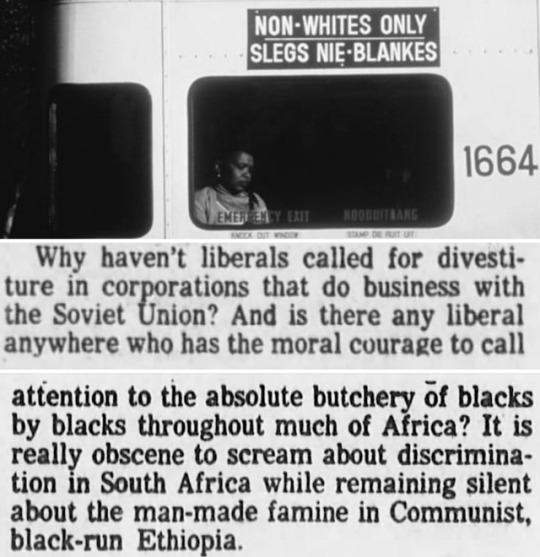
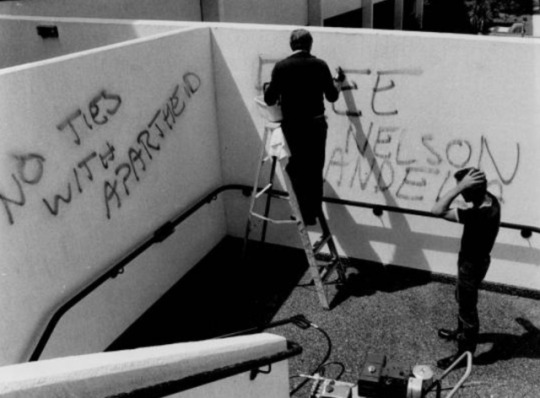
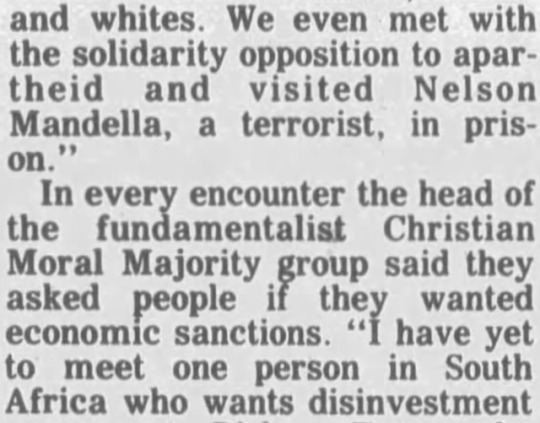
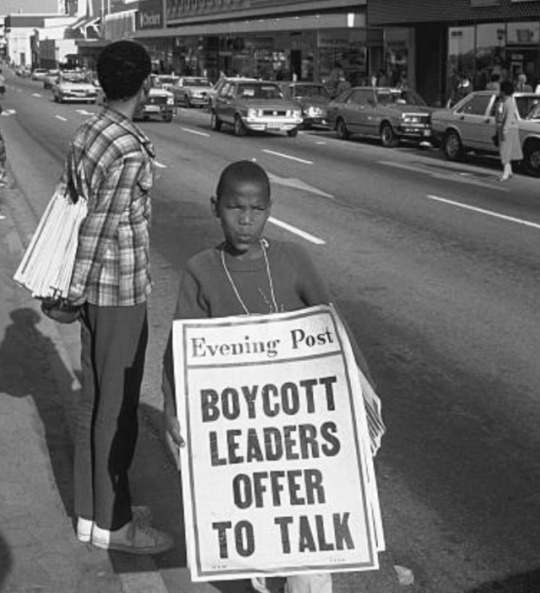
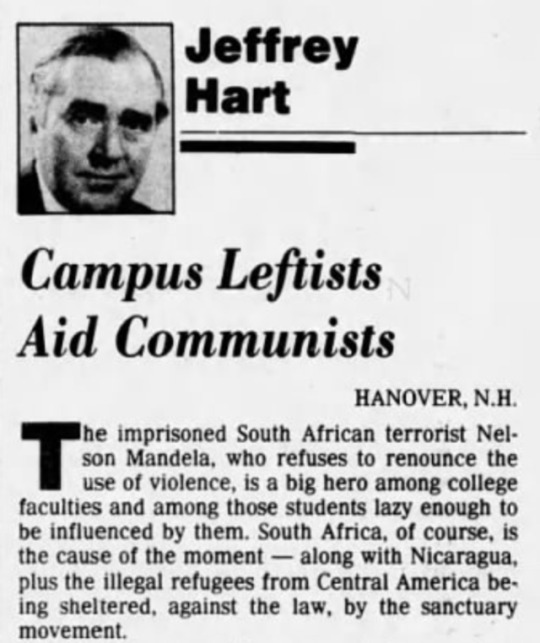
5K notes
·
View notes
Text

#yemen#jerusalem#tel aviv#current events#palestine#free palestine#gaza#free gaza#news on gaza#palestine news#news update#war news#war on gaza#apartheid#south africa#apartheid israel#gaza genocide#palestine genocide#genocide
9K notes
·
View notes
Text

Apartheid South Africa, 1953.

Occupied Palestine, 2022.
The sign is located at the entrance to the illegal Bat Ayin settlement in the West Bank. It begins with the word "warning" written in Arabic, and continues in Hebrew. Translated, the full text reads:
Warning. This road leads to the Bat Ayin settlement which is under Jewish control. Entry to Arabs is not allowed and endangers your life. You were warned! - Freedom fighters of Israel.
Source: @/BlyykrL on twitter, a Zionist settler who tried to establish a new illegal outpost near Bat Ayin.
6K notes
·
View notes
Text
Has anyone talked about how the main girly from mean girls parents where probably fleeing (like nazis) after the arparthide ended.
It ended in 1990, the movie came out in 2004. If they’re either junior or senior (prom) that means they’re 16-17. Meaning she was born 1987-1988. 2-3 years before apartheid ended. Her parents probably in their mid 20s - mid 30s. Fleeing South Africa. Anyways. Crazy.
Me an my boyfriend put this together while waiting for rice to cook.
0 notes
Text
This article is from 2022, but it came up in the context of Palestine:
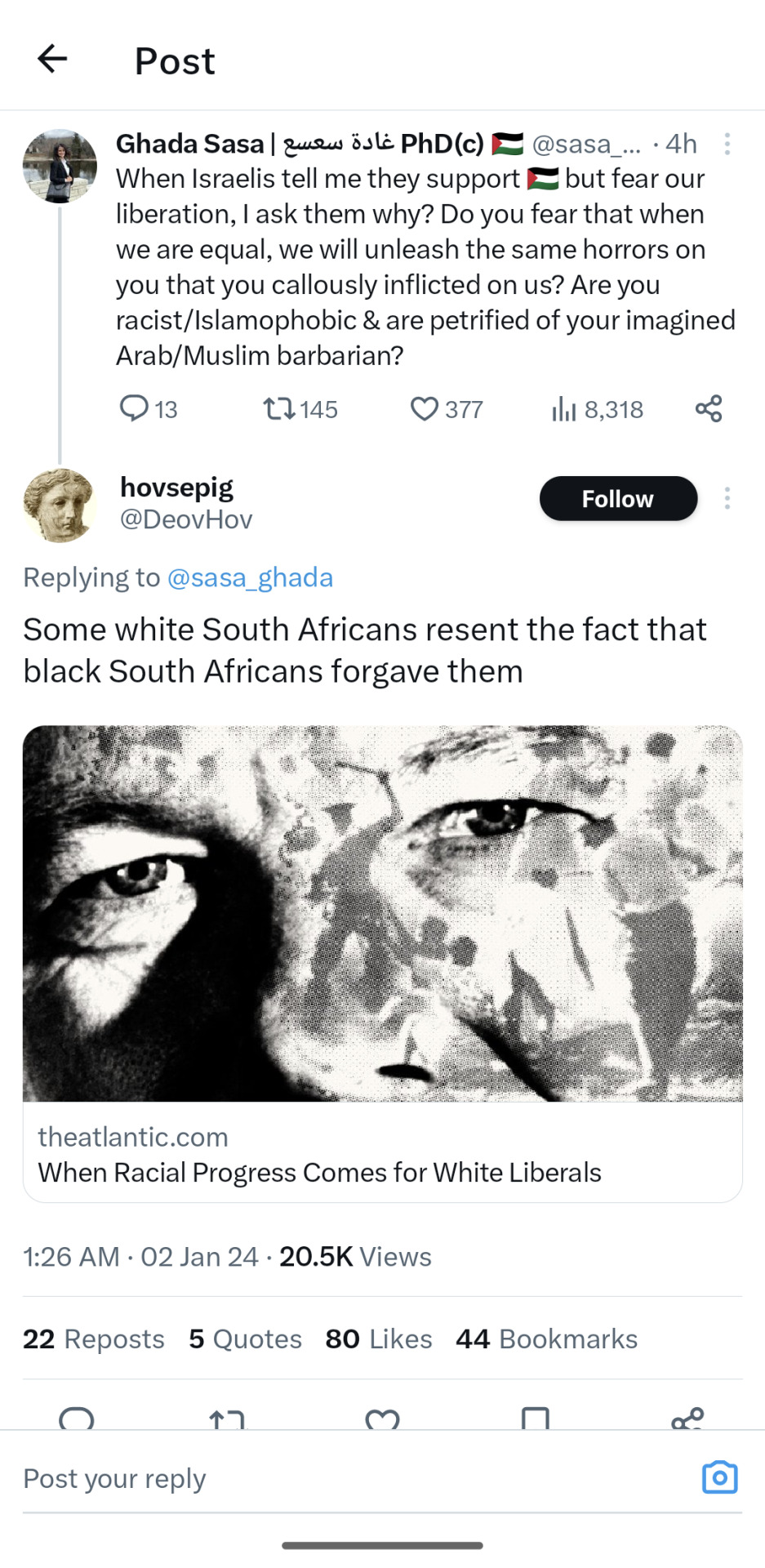
Here are some striking passages, relevant to all colonial aftermaths but certainly also to the forms we see Zionist reaction taking at the moment:
Over the decade I lived in South Africa, I became fascinated by this white minority [i.e. the whole white population post-apartheid as a minority in the country], particularly its members who considered themselves progressive. They reminded me of my liberal peers in America, who had an apparently self-assured enthusiasm about the coming of a so-called majority-minority nation. As with white South Africans who had celebrated the end of apartheid, their enthusiasm often belied, just beneath the surface, a striking degree of fear, bewilderment, disillusionment, and dread.
[...]
Yet these progressives’ response to the end of apartheid was ambivalent. Contemplating South Africa after apartheid, an Economist correspondent observed that “the lives of many whites exude sadness.” The phenomenon perplexed him. In so many ways, white life remained more or less untouched, or had even improved. Despite apartheid’s horrors—and the regime’s violence against those who worked to dismantle it—the ANC encouraged an attitude of forgiveness. It left statues of Afrikaner heroes standing and helped institute the Truth and Reconciliation Commission, which granted amnesty to some perpetrators of apartheid-era political crimes.
But as time wore on, even wealthy white South Africans began to radiate a degree of fear and frustration that did not match any simple economic analysis of their situation. A startling number of formerly anti-apartheid white people began to voice bitter criticisms of post-apartheid society. An Afrikaner poet who did prison time under apartheid for aiding the Black-liberation cause wrote an essay denouncing the new Black-led country as “a sewer of betrayed expectations and thievery, fear and unbridled greed.”
What accounted for this disillusionment? Many white South Africans told me that Black forgiveness felt like a slap on the face. By not acting toward you as you acted toward us, we’re showing you up, white South Africans seemed to hear. You’ll owe us a debt of gratitude forever.
The article goes on to discuss:
"Mau Mau anxiety," or the fear among whites of violent repercussions, and how this shows up in reported vs confirmed crime stats - possibly to the point of false memories of home invasion
A sense of irrelevance and alienation among this white population, leading to another anxiety: "do we still belong here?"
The sublimation of this anxiety into self-identification as a marginalized minority group, featuring such incredible statements as "I wanted to fight for Afrikaners, but I came to think of myself as a ‘liberal internationalist,’ not a white racist...I found such inspiration from the struggles of the Catalonians and the Basques. Even Tibet" and "[Martin Luther] King [Jr.] also fought for a people without much political representation … That’s why I consider him one of my most important forebears and heroes,” from a self-declared liberal environmentalist who also thinks Afrikaaners should take back government control because they are "naturally good" at governance
Some discussion of the dynamics underlying these reactions, particularly the fact that "admitting past sins seem[ed] to become harder even as they receded into history," and US parallels
And finally, in closing:
The Afrikaner journalist Rian Malan, who opposed apartheid, has written that, by most measures, its aftermath went better than almost any white person could have imagined. But, as with most white progressives, his experience of post-1994 South Africa has been complicated. [...]
He just couldn’t forgive Black people for forgiving him. Paradoxically, being left undisturbed served as an ever-present reminder of his guilt, of how wrongly he had treated his maid and other Black people under apartheid. “The Bible was right about a thing or two,” he wrote. “It is infinitely worse to receive than to give, especially if … the gift is mercy.”
14K notes
·
View notes
Text
9 notes
·
View notes
Text
Never thought I’d say actual apartheid apologism on tumblr.
Some fuckers never fail to disappoint!
Sickening shit!
I wont be surprised if they start bleating on about “white genocide”, which isn’t a thing by the way, it’s just a conspiracy spread by European and American far right bloggers and middle aged mediocrities who don’t know what genocide actually is!
#dougie rambles#personal stuff#south africa#apartheid#apartheid south africa#i feel sick#political crap#fuck’s sake#enough of this shit#bigotry#fucking hell
2 notes
·
View notes
Text
#South African#jerusalem#israel#South Africa#gaza#israeli apartheid#israel is an apartheid state#free palestine#palestine#فلسطين#free gaza#gaza under attack#gaza under genocide#i stand with palestine
9K notes
·
View notes
Text
November 24/25/26, 2023 - Despite the temporary ceasefire the people of the world are still taking to the streets everywhere in huge numbers to demand an enduring end to Israel's occupation and genocide of the Palestinian people. Here is a small selection of the solidarity demonstrations this past weekend. People are not letting themselves be tired out or distracted, Palestine is not alone!

Havana, Cuba
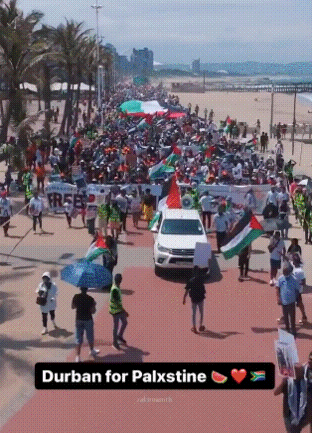
Durban, South Africa
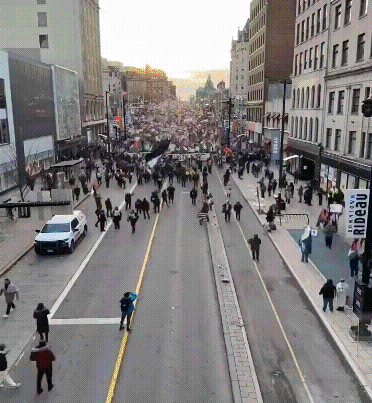
Ottawa, Canada
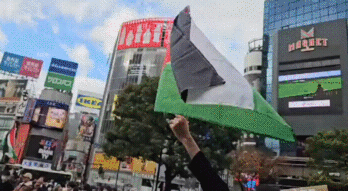
Tokyo, Japan


Jakarta, Indonesia / Doha, Qatar

Tangier, Morocco
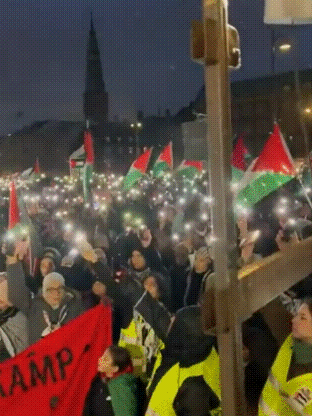
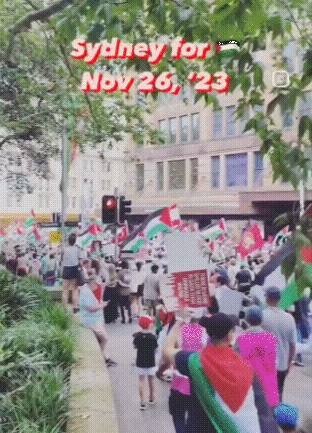
Copenhagen, Denmark / Sydney, Australia
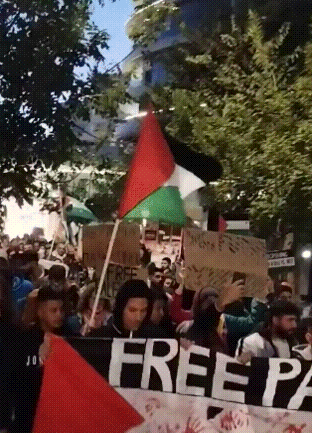
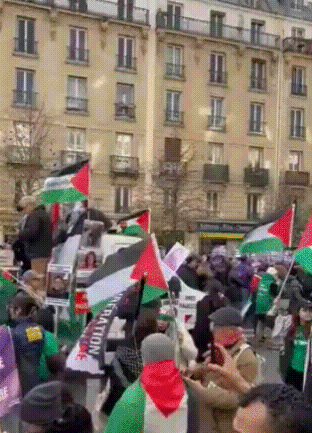
Nicosia, Cyprus / Paris, France


New York City, USA / London, UK
#free palestine#palestine#solidarity#anti-colonialism#demonstration#2023#gif#long post#apartheid#occupation#ceasefire#cuba#canada#south africa#japan#indonesia#qatar#morocco#denmark#australia#cyprus#france#usa#uk
10K notes
·
View notes
Text

Now and then
#israeli apartheid#israel is an apartheid state#south africa#israel#free palestine#palestine#support palestine#palestinian genocide#gaza
2K notes
·
View notes